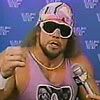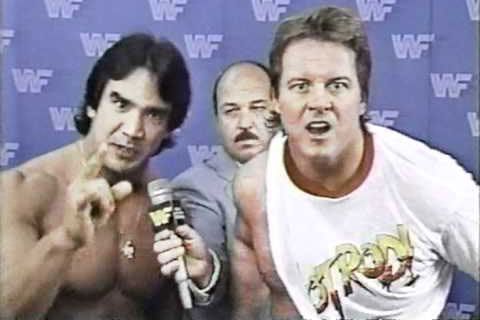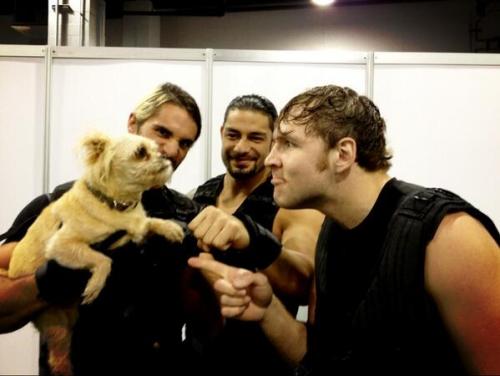Post by Deep Shadows on Aug 5, 2008 1:21:08 GMT -5
On Saturday night, Brock Lesnar goes into the cage with Heath Herring to answer a question: Is previous fame heading into a mixed martial arts career a blessing or a curse?
Lesnar, a former NCAA wrestling champion and World Wrestling Entertainment star, is one of the greatest athletic prospects to ever come into the sport. He has size, strength and, most of all, incredible quickness and reflexes for a man who had to cut weight to make the 265-pound heavyweight limit.
But as he heads into Saturday’s UFC 87 showdown against rugged veteran Heath Herring, he runs the risk that his headlining fame will be over just as quickly as it started.
“There’s always pressure to win in every circumstance,” said Lesnar. “Me, being very new, nobody wants to follow a loser. I don’t want to say my back is against the wall, but I put pressure on myself. There’s no added pressure in my mind, but I want to win the fight.”
Lesnar can’t afford a second straight loss on a major pay-per-view event and still be considered a long-term main eventer.
And with a hefty contract, Lesnar (1-1 overall; 0-1 UFC) is unlikely to be kept around unless he can be a major pay-per-view seller. It’s not a lock that if he loses he’ll be gone, but if he looks bad or is knocked out, it’s a distinct possibility. UFC last year cut Mirko Cro Cop, a similarly highly paid heavyweight, after two losses.
“I plan on being around for a while,” said Lesnar.
After signing a lucrative UFC deal, Lesnar’s first match, on Feb. 2, was against Frank Mir, a former UFC heavyweight champion, who is noted for being one of the best submission heavyweights in the sport. Lesnar looked like an unstoppable, but also undisciplined, force – for about 85 seconds. Lesnar exploded for takedowns that were more like violent linebacker hits. His quickness in moving on the ground was freakish for a man of his size, leaving Mir in immediate disbelief. Lesnar was battering the former champ on the ground, who kept thinking to himself to just keep moving so the match wouldn’t be stopped. Lesnar even knocked Mir down with a punch.
ADVERTISEMENT
Five seconds later, it was over, and Mir’s arm raised in victory.
“I had a dominant position and I stood up and made an amateur mistake,” said Lesnar.
Lesnar got to his feet after escaping an armbar on the ground, leaving his leg behind, and Mir caught Lesnar in a kneebar, causing him to tap out. It was a spot Lesnar drilled regularly in practice before the fight, and even more after.
In response to the loss, Lesnar added Rodrigo “Comprido” Medeiros, a seven-time Brazilian jiu-jitsu world champion, to his team of coaches.
“I worked a lot of stand-up this camp,” he said. “We worked on all aspects of wrestling, a lot of jiu-jitsu defense, a lot of leg kick defense. Heath has a strong right hand and is well-rounded with his kicks. We haven’t left any rock unturned for this fight.
“First and foremost, I didn’t like to lose,” Lesnar said. “Nobody likes to lose. I have to be a little more relaxed. I’m a little more relaxed and a little more polished. I’ve had a few more months to train. The Brock Lesnar now against the Brock Lesnar then, I’d beat him.”
The estimated 600,000 buys Lesnar’s match with Mir did on pay-per-view is bigger than any boxing or MMA match has done so far this year, and among the biggest in MMA history. Even more impressive, UFC sources indicated nearly half had never purchased a UFC event before.
Because UFC president Dana White saw the potential of bringing new fans to the sport, Lesnar walked into the company as one of its highest paid fighters, at a $250,000 base guarantee plus undisclosed bonuses.
But because of that same drawing power, and the cost, his early path is opposite to how UFC has treated similar heavyweight prospects Shane Carwin and Cain Velasquez, or how Elite XC has booked Kimbo Slice.
The others have been given lower or mid-level opponents to start out with to build their reputation. UFC decided that with what they were paying Lesnar, there was going to be no such slow grooming process.
“I said from the beginning I didn’t want any easy fights, and Heath is not an easy opponent,” said Lesnar.
Things are a lot different in match No. 2. The company did an intense marketing campaign around his debut, pushing him as a former WWE champion, showing clips of his pro wrestling matches and using him as an outsider from pro wrestling coming into UFC to see what happens if a pro wrestler were to fight for real.
But for this fight, things are different. Lesnar is no longer a novelty act to either the media or the audience. He’s a name fighter, but one who has to prove himself. He hasn’t been marketed as hard as he was for the first show. He’s clearly the draw for the live show and expected to be the most popular fighter on the show, which heading into the week has sold 11,000 tickets for $2.2 million. That’s a 180-degree turn from the Las Vegas crowd, which booed him out of the arena, seeing him as a fake pro wrestler invading their sport. But on a national basis, the main event is clearly Georges St. Pierre’s welterweight title defense against Jon Fitch.
“I think experience is something that is much needed,” admitted Lesnar, now 31, facing a man who is actually a year younger than he is even though he’s almost a pioneer heavyweight in the sport.
Texan Herring has 41 pro fights over the past 11 years, in nearly every major organization. He became a star in Japan at the age of 22, and has been in the ring with a Who’s Who list of the greatest heavyweights of all-time.
“For me, I’ve been able to get a lot of experience in the training room,” said Lesnar.
Herring, a big star during PRIDE’s heyday in Japan when he was known as “The Texas Crazy Horse” for his unique multi-colored hair, noted he’s beaten men bigger than the 6-2 ½, 277-pound Lesnar, as well as higher credentialed wrestlers. He’s best known for a 2000 win over Tom Erikson, a 300-pounder with better amateur credentials than Lesnar, who had never lost up to that point. But Erikson was 36 and had never focused 100 percent on the sport the way Lesnar has. Herring also beat Mark Kerr, a former NCAA champion, in 2001 when beating Kerr, an early MMA star, still meant something. Against the top wrestlers, both opponents come out strong with takedowns. But in both cases, they started getting tired. In each case, Herring caught them with knees as they shot in, and quickly finished them.
But in Herring’s UFC debut on January 25, 2007, that never happened and Jake O’Brien outwrestled him for three rounds to earn a decision win. O’Brien, while a good college wrestler, isn’t nearly as big, as strong, or the level of wrestler as Lesnar.
Herring (28-13), is known for being difficult to finish; he went the distance twice with Antonio Rodrigo Nogueira in their three meetings, after being submitted the first time. But he was beaten by his most famous opponents in Japan, by Cro Cop from strikes on the ground, and by Fedor Emelianenko due to blood.
By Dave Meltzer, Yahoo! Sports
10 hours, 33 minutes ago
sports.yahoo.com/mma/news?slug=dm-lesnar080408&prov=yhoo&type=lgns
Lesnar, a former NCAA wrestling champion and World Wrestling Entertainment star, is one of the greatest athletic prospects to ever come into the sport. He has size, strength and, most of all, incredible quickness and reflexes for a man who had to cut weight to make the 265-pound heavyweight limit.
But as he heads into Saturday’s UFC 87 showdown against rugged veteran Heath Herring, he runs the risk that his headlining fame will be over just as quickly as it started.
“There’s always pressure to win in every circumstance,” said Lesnar. “Me, being very new, nobody wants to follow a loser. I don’t want to say my back is against the wall, but I put pressure on myself. There’s no added pressure in my mind, but I want to win the fight.”
Lesnar can’t afford a second straight loss on a major pay-per-view event and still be considered a long-term main eventer.
And with a hefty contract, Lesnar (1-1 overall; 0-1 UFC) is unlikely to be kept around unless he can be a major pay-per-view seller. It’s not a lock that if he loses he’ll be gone, but if he looks bad or is knocked out, it’s a distinct possibility. UFC last year cut Mirko Cro Cop, a similarly highly paid heavyweight, after two losses.
“I plan on being around for a while,” said Lesnar.
After signing a lucrative UFC deal, Lesnar’s first match, on Feb. 2, was against Frank Mir, a former UFC heavyweight champion, who is noted for being one of the best submission heavyweights in the sport. Lesnar looked like an unstoppable, but also undisciplined, force – for about 85 seconds. Lesnar exploded for takedowns that were more like violent linebacker hits. His quickness in moving on the ground was freakish for a man of his size, leaving Mir in immediate disbelief. Lesnar was battering the former champ on the ground, who kept thinking to himself to just keep moving so the match wouldn’t be stopped. Lesnar even knocked Mir down with a punch.
ADVERTISEMENT
Five seconds later, it was over, and Mir’s arm raised in victory.
“I had a dominant position and I stood up and made an amateur mistake,” said Lesnar.
Lesnar got to his feet after escaping an armbar on the ground, leaving his leg behind, and Mir caught Lesnar in a kneebar, causing him to tap out. It was a spot Lesnar drilled regularly in practice before the fight, and even more after.
In response to the loss, Lesnar added Rodrigo “Comprido” Medeiros, a seven-time Brazilian jiu-jitsu world champion, to his team of coaches.
“I worked a lot of stand-up this camp,” he said. “We worked on all aspects of wrestling, a lot of jiu-jitsu defense, a lot of leg kick defense. Heath has a strong right hand and is well-rounded with his kicks. We haven’t left any rock unturned for this fight.
“First and foremost, I didn’t like to lose,” Lesnar said. “Nobody likes to lose. I have to be a little more relaxed. I’m a little more relaxed and a little more polished. I’ve had a few more months to train. The Brock Lesnar now against the Brock Lesnar then, I’d beat him.”
The estimated 600,000 buys Lesnar’s match with Mir did on pay-per-view is bigger than any boxing or MMA match has done so far this year, and among the biggest in MMA history. Even more impressive, UFC sources indicated nearly half had never purchased a UFC event before.
Because UFC president Dana White saw the potential of bringing new fans to the sport, Lesnar walked into the company as one of its highest paid fighters, at a $250,000 base guarantee plus undisclosed bonuses.
But because of that same drawing power, and the cost, his early path is opposite to how UFC has treated similar heavyweight prospects Shane Carwin and Cain Velasquez, or how Elite XC has booked Kimbo Slice.
The others have been given lower or mid-level opponents to start out with to build their reputation. UFC decided that with what they were paying Lesnar, there was going to be no such slow grooming process.
“I said from the beginning I didn’t want any easy fights, and Heath is not an easy opponent,” said Lesnar.
Things are a lot different in match No. 2. The company did an intense marketing campaign around his debut, pushing him as a former WWE champion, showing clips of his pro wrestling matches and using him as an outsider from pro wrestling coming into UFC to see what happens if a pro wrestler were to fight for real.
But for this fight, things are different. Lesnar is no longer a novelty act to either the media or the audience. He’s a name fighter, but one who has to prove himself. He hasn’t been marketed as hard as he was for the first show. He’s clearly the draw for the live show and expected to be the most popular fighter on the show, which heading into the week has sold 11,000 tickets for $2.2 million. That’s a 180-degree turn from the Las Vegas crowd, which booed him out of the arena, seeing him as a fake pro wrestler invading their sport. But on a national basis, the main event is clearly Georges St. Pierre’s welterweight title defense against Jon Fitch.
“I think experience is something that is much needed,” admitted Lesnar, now 31, facing a man who is actually a year younger than he is even though he’s almost a pioneer heavyweight in the sport.
Texan Herring has 41 pro fights over the past 11 years, in nearly every major organization. He became a star in Japan at the age of 22, and has been in the ring with a Who’s Who list of the greatest heavyweights of all-time.
“For me, I’ve been able to get a lot of experience in the training room,” said Lesnar.
Herring, a big star during PRIDE’s heyday in Japan when he was known as “The Texas Crazy Horse” for his unique multi-colored hair, noted he’s beaten men bigger than the 6-2 ½, 277-pound Lesnar, as well as higher credentialed wrestlers. He’s best known for a 2000 win over Tom Erikson, a 300-pounder with better amateur credentials than Lesnar, who had never lost up to that point. But Erikson was 36 and had never focused 100 percent on the sport the way Lesnar has. Herring also beat Mark Kerr, a former NCAA champion, in 2001 when beating Kerr, an early MMA star, still meant something. Against the top wrestlers, both opponents come out strong with takedowns. But in both cases, they started getting tired. In each case, Herring caught them with knees as they shot in, and quickly finished them.
But in Herring’s UFC debut on January 25, 2007, that never happened and Jake O’Brien outwrestled him for three rounds to earn a decision win. O’Brien, while a good college wrestler, isn’t nearly as big, as strong, or the level of wrestler as Lesnar.
Herring (28-13), is known for being difficult to finish; he went the distance twice with Antonio Rodrigo Nogueira in their three meetings, after being submitted the first time. But he was beaten by his most famous opponents in Japan, by Cro Cop from strikes on the ground, and by Fedor Emelianenko due to blood.
By Dave Meltzer, Yahoo! Sports
10 hours, 33 minutes ago
sports.yahoo.com/mma/news?slug=dm-lesnar080408&prov=yhoo&type=lgns












